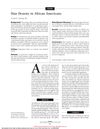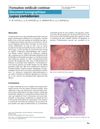 8 citations,
September 2021 in “Journal of Cosmetic Dermatology”
8 citations,
September 2021 in “Journal of Cosmetic Dermatology” Some diets and supplements might help with skin disorders, but their effectiveness varies and more research is needed.
 2 citations,
January 2021 in “Cureus”
2 citations,
January 2021 in “Cureus” Long-term anabolic steroid use can lead to heart and metabolic health issues.
August 2024 in “Nutrients” Probiotics help reduce hair loss and increase hair growth in people with androgenic alopecia.
 19 citations,
December 2021 in “Endocrine Reviews”
19 citations,
December 2021 in “Endocrine Reviews” There are various effective hormone treatments for puberty induction in boys and girls with hypogonadism, and starting treatment early is important.
16 citations,
February 2014 in “Iranian Red Crescent Medical Journal” Polycystic Ovary Syndrome (PCOS) affects Iranian women's feelings of femininity and self-image.
 14 citations,
January 2008 in “Dermatology Online Journal”
14 citations,
January 2008 in “Dermatology Online Journal” Hormonal therapies like cyproterone acetate and spironolactone may help some women with hair loss, but finasteride 1mg is not useful, and the effectiveness of other treatments is still unclear.
 6 citations,
June 2022 in “Dermatologic Therapy”
6 citations,
June 2022 in “Dermatologic Therapy” Honokiol from Magnolia plants may be beneficial for treating various skin conditions and promoting hair growth.
 5 citations,
October 2022 in “Heliyon”
5 citations,
October 2022 in “Heliyon” Polycystic ovary syndrome, a disorder causing menstrual issues and infertility, can be treated with lifestyle changes, medication, herbal remedies, surgery, and assisted reproductive techniques like artificial insemination and IVF.
 4 citations,
May 2024 in “The Lancet”
4 citations,
May 2024 in “The Lancet” Bariatric surgery improves ovulation rates in women with PCOS and obesity better than medical therapy.
 3 citations,
June 2023 in “Medicines”
3 citations,
June 2023 in “Medicines” Some antiseizure medications can cause reversible hair loss, with valproate, lamotrigine, and carbamazepine being the most common.
 September 2024 in “International Journal of Molecular Sciences”
September 2024 in “International Journal of Molecular Sciences” Hydrangea serrata extract may promote hair growth and improve hair health.

Hair and nails can show hormone changes during puberty in dogs.
 January 2017 in “Journal of Investigative Dermatology Symposium Proceedings”
January 2017 in “Journal of Investigative Dermatology Symposium Proceedings” The 2015 Hair Research Congress concluded that stem cells, maraviroc, and simvastatin could potentially treat Alopecia Areata, topical minoxidil, finasteride, and steroids could treat Frontal Fibrosing Alopecia, and PTGDR2 antagonists could also treat alopecia. They also found that low-level light therapy could help with hair loss, a robotic device could assist in hair extraction, and nutrition could aid hair growth. They suggested that Alopecia Areata is an inflammatory disorder, not a single disease, indicating a need for personalized treatments.
 January 2008 in “Dermatology Online Journal”
January 2008 in “Dermatology Online Journal” Hormonal therapy like cyproterone acetate and spironolactone may help female hair loss, but more research is needed, especially for pre-menopausal women.
May 2021 in “F1000Research” The treatment led to denser, thicker hair growth and less hair loss.
 138 citations,
October 2012 in “Behavioral Ecology”
138 citations,
October 2012 in “Behavioral Ecology” Masculine facial features may not reliably indicate heritable health, and more research is needed.
 185 citations,
March 2011 in “The Journal of Sexual Medicine”
185 citations,
March 2011 in “The Journal of Sexual Medicine” Finasteride for hair loss can cause long-lasting sexual side effects like low libido and erectile dysfunction.
 16 citations,
November 2021 in “Antioxidants”
16 citations,
November 2021 in “Antioxidants” Managing oxidative stress might help treat low testosterone and related chronic diseases in aging men.
 4 citations,
December 2021 in “Archivio italiano di urologia andrologia”
4 citations,
December 2021 in “Archivio italiano di urologia andrologia” Certain drugs, especially antiandrogens and spironolactone, significantly increase the risk of gynecomastia.
 14 citations,
April 2014 in “International Journal of Cosmetic Science”
14 citations,
April 2014 in “International Journal of Cosmetic Science” Acne is caused by multiple factors including oil production, bacteria, inflammation, and possibly diet and environment.
 1 citations,
January 2022 in “Health”
1 citations,
January 2022 in “Health” COVID-19 has widely affected health, various industries, and the economy, but also led to more remote work and less pollution.
 February 2021 in “Research Square (Research Square)”
February 2021 in “Research Square (Research Square)” The Li-Pa/Ca and Do/Ca chemotherapy regimens for serous ovarian cancer showed better short-term and long-term results than the Pa/Ca regimen.
 129 citations,
June 1999 in “Archives of Dermatology”
129 citations,
June 1999 in “Archives of Dermatology” African Americans have less hair density than whites.
 10 citations,
August 2019 in “The World Journal of Men's Health”
10 citations,
August 2019 in “The World Journal of Men's Health” Kimchi probiotics slightly improved hair density, but more research needed.
 31 citations,
May 2012 in “European Journal of Dermatology”
31 citations,
May 2012 in “European Journal of Dermatology” Menopause affects hair and skin; more research needed for treatment.
 21 citations,
January 2015 in “Oncology Research and Treatment”
21 citations,
January 2015 in “Oncology Research and Treatment” Scalp cooling can prevent hair loss in 65% of chemotherapy patients, especially effective in breast cancer patients and certain chemotherapy types.
 15 citations,
May 2016 in “Archives of Dermatological Research”
15 citations,
May 2016 in “Archives of Dermatological Research” ULBP3 could be a marker for diagnosing alopecia areata incognita and may be linked to its cause and development.
 7 citations,
November 2007 in “Annales de Dermatologie et de Vénéréologie”
7 citations,
November 2007 in “Annales de Dermatologie et de Vénéréologie” A man was diagnosed with a rare form of lupus after showing unique skin symptoms that responded well to treatment.
 170 citations,
December 2009 in “Histopathology”
170 citations,
December 2009 in “Histopathology” The conclusion is that accurate diagnosis of different types of hair loss requires good teamwork between skin doctors and lab experts.
 74 citations,
September 1980 in “Medical Clinics of North America”
74 citations,
September 1980 in “Medical Clinics of North America” Toxic epidermal necrolysis is a severe skin condition often caused by drugs, with complex treatment and a high risk of death, but survivors usually heal without scars.



























